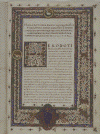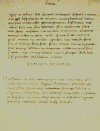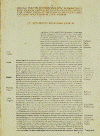
Though clearly not Christian, and sometimes obscene, the Roman epigrammatist Martial was a favorite author among curial humanists. In the 1470s, Pomponio Leto encouraged Niccolo Perotti, a prominent member of Cardinal Bessarion's circle, to edit their common efforts to explain the difficult text of Martial's "Epigrams." This manuscript was annotated by both Leto and Perotti. In a marginal note Perotti explains a Latin word by giving its Greek etymology, "striblo."
Vat. lat. 6848 fols. 7 verso-8 recto human21 JH.12

In addition to the rediscovery of ancient Latin texts, an important goal of the humanists' cultural program was the translation of ancient Greek literature into Latin. The knowledge of Greek spread rapidly among Italian humanists of the fifteenth century, thanks largely to the influence of Byzantine emigres and refugees, but was always something of a luxury; Latin remained the basic means of communication among the learned. Hence the interest of patrons and humanists alike in making the literature of the Greeks available to educated westerners in Latin versions. The volume on display was the first translation into a western language of Herodotus, "the Father of History," the source and model for much of classical historiography, undertaken by the most famous Roman humanist of the mid-fifteenth century, the brilliant and controversial Lorenzo Valla. This was a presentation copy for Pope Pius II's nephew, Cardinal Francesco Todeschini Piccolomini, a great Roman book-collector and a leading patron of fine calligraphy and book illustration.
Chig. I. VIII 275 fol. 2 recto human22 JH.15

Niccolo Perotti compiled a vast commentary on Martial under the title "Cornucopia" and dedicated the work to the papal condottiere Federigo da Montefeltro. Later the work was revised and expanded by Perotti's son Pyrrhus, using the dedication copy lent him by Federigo's son Guido. Pyrrhus made a number of additions of his own on the grounds that "with commentaries of this sort, the longer they are, the better." In this document we can see how Perotti incorporated the etymology offered in the earlier manuscript [human21 = Vat. lat. 6848] into the text of his Cornucopia. We can also see how Pyrrhus has expanded his father's note in a marginal annotation.
Urb. lat. 301 fols. IV verso-V recto human23 JH.19

The fifteenth century saw not only the revival of ancient Roman culture in the West, but the death of the Roman--or Byzantine-- Empire in the East. Throughout the fifteenth century, cultural debris from the wrecked empire--men, antiquities, and books-- streamed westward, where they enriched the burgeoning civilization of Renaissance Italy. Janus Lascaris was one of many Greek scholars who found a warm welcome and an eager audience among Western patrons and scholars. Lorenzo de'Medici put him in charge of acquiring in the East a collection of manuscripts that he dreamed might one day rival the legendary library of Alexandria. Years later, Lorenzo's grandson, Leo X, made Lascaris professor of Greek at the University of Rome and a prominent member of his "Neacademia" or New Academy. The book on display is the product of Lascaris's careful Homeric scholarship: a collection of ancient notes on the text, culled from old manuscripts. The colophon tells us that this book was printed on a Greek printing press located in the house of Angelo Colocci, a high curial official who was also a wealthy patron of the humanities.
Rossiano 3243 pp. 342-43 human24 JH.27

The first task in the humanists' revival of ancient literary culture was the rediscovery and collection of the surviving literary monuments of the ancient world. The most famous and successful of these literary explorers was the papal secretary, Poggio Bracciolini, who rediscovered texts of Quintilian, Asconius, Valerius Flaccus, Lucretius, Silius Italicus, Ammianus Marcellinus and ten hitherto unknown orations of Cicero. This book, containing eight of these recovered orations, was copied by Poggio while book-hunting in Cologne and Langres during the summer of 1417. The colophon on fol. 49 verso may be translated, "This oration, formerly lost owing to the fault of the times, Poggio restored to the Latin-speaking world and brought it back to Italy, having found it hidden in Gaul, in the woods of Langres, and having written it in memory of Tully [Cicero] and for the use of the learned."
Vat. lat. 11458 fol. 94 recto human25 JH.50

Both Niccolo's and Pyrrhus's notes were incorporated in the first printed edition of the Cornucopia. In the preface to the Venetian edition, the editor, Ludovicus Odaxius, thanks Guido da Montefeltro for lending him the dedication copy annotated by Pirro for the printed version.
Stamp. Chig. II 567 fol. 3 recto (sig. a 3 recto) human26 JH.60